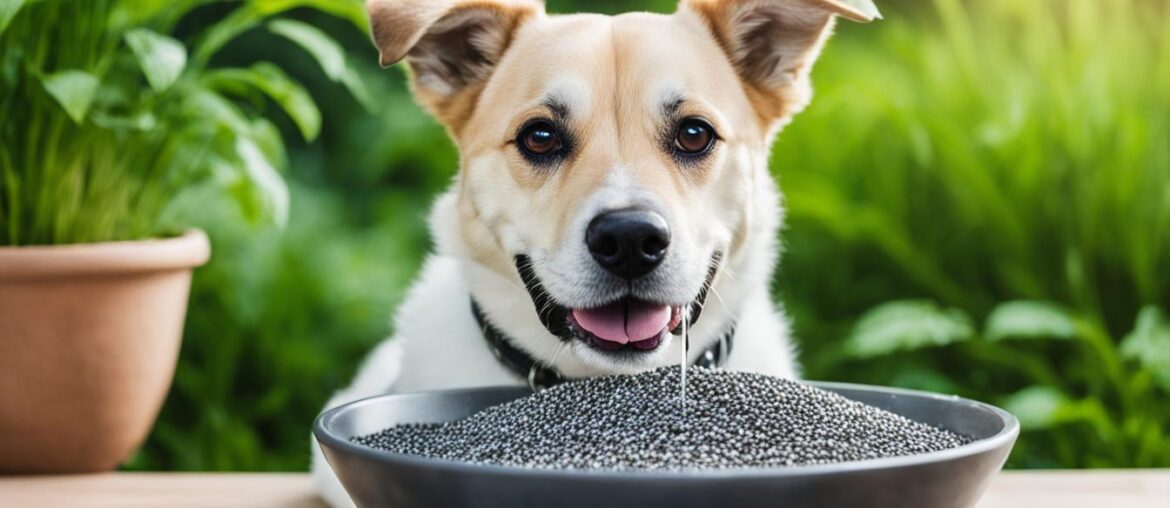Chia seeds have gained significant popularity as a superfood for dogs due to their numerous health benefits. Packed with omega-3 fatty acids, fiber, protein, antioxidants, and essential vitamins and minerals, chia seeds can be a valuable addition to a dog’s diet.
When incorporated into a dog’s meals, chia seeds can strengthen the immune system, improve skin and coat health, support joint mobility, and regulate blood sugar levels. However, it is important to introduce chia seeds gradually and monitor for any adverse reactions.
Consultation with a veterinarian is highly recommended before making any changes to your dog’s diet.
Key Takeaways:
- Chia seeds are considered a superfood for dogs.
- They are rich in omega-3 fatty acids, fiber, protein, antioxidants, and essential vitamins and minerals.
- Chia seeds can boost the immune system, improve skin and coat health, support joint mobility, and regulate blood sugar levels.
- Introduce chia seeds gradually into a dog’s diet and monitor for any adverse reactions.
- Consultation with a veterinarian is recommended before making any dietary changes for your dog.
The Nutritional Value of Chia Seeds for Dogs
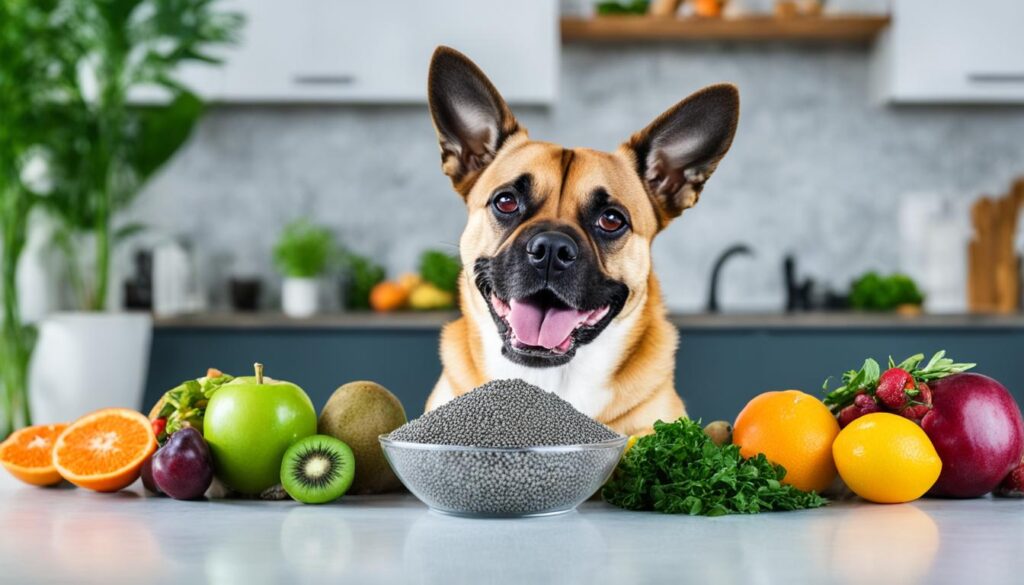
Chia seeds are a nutritional powerhouse for dogs, providing a wide range of essential nutrients that contribute to their overall health and well-being. These tiny seeds pack a big punch when it comes to canine nutrition.
First and foremost, chia seeds are rich in omega-3 fatty acids, which are known for their numerous health benefits. Omega-3 fatty acids promote a healthy coat and skin, reduce inflammation, and support brain health in dogs. Incorporating chia seeds into a dog’s diet can help maintain a lustrous coat and prevent dry, itchy skin.
In addition to omega-3 fatty acids, chia seeds also offer fiber, protein, antioxidants, iron, magnesium, calcium, and B vitamins. Let’s break down the nutritional value of these components:
- Fiber: Chia seeds are an excellent source of dietary fiber, which aids in digestion and maintains a healthy gut. Fiber can help prevent constipation and regulate bowel movements in dogs.
- Protein: Chia seeds provide a plant-based source of protein, which is essential for muscle growth, repair, and overall development in dogs. Protein also plays a vital role in supporting a strong immune system.
- Antioxidants: Chia seeds contain antioxidants, such as quercetin and chlorogenic acid, which help protect the body against cellular damage from free radicals. These antioxidants contribute to a dog’s overall health and help maintain a strong immune system.
- Minerals: Chia seeds are a rich source of minerals like iron, magnesium, and calcium. These minerals support various bodily functions, including oxygen transport, bone health, and muscle function in dogs.
- B Vitamins: Chia seeds contain several B vitamins, including thiamine, riboflavin, niacin, and folate. These vitamins are important for energy production, nerve function, and overall metabolism in dogs.
To incorporate chia seeds into a dog’s food, simply sprinkle a small amount on top of their meals. It’s important to start with a small quantity to gauge their tolerance and gradually increase the amount. This gradual introduction helps prevent any potential digestive upset.
Chia seeds are a versatile addition to a dog’s diet, providing a boost of essential nutrients for their overall health and vitality. However, it’s always recommended to consult with a veterinarian before making any significant dietary changes for your furry friend.
Chia Seeds for Skin and Coat Health in Dogs

Chia seeds can be a fantastic supplement to improve the skin and coat health of your beloved dog. These tiny seeds are packed with omega-3 fatty acids, which are essential for maintaining healthy skin and a lustrous coat. The omega-3 fatty acids help moisturize the skin, reduce itching and inflammation, and promote a shiny coat that will surely turn heads at the dog park.
In addition to omega-3 fatty acids, chia seeds are also rich in antioxidants. These antioxidants play a crucial role in protecting the skin cells from damage caused by free radicals. By incorporating chia seeds into your dog’s diet, you can help maintain the overall health and vitality of their skin, making it softer, smoother, and more lustrous.
Adding chia seeds as a regular supplement to your dog’s diet is simple. You can sprinkle a teaspoon or two of chia seeds onto your dog’s food, providing them with the essential nutrients they need for healthy skin and coat. Just make sure to introduce chia seeds gradually, starting with a small amount, and monitor your dog’s response.
Remember, chia seeds should be used as a supplement to a well-balanced diet and not as a replacement for other important nutrients. If you have any concerns or questions about incorporating chia seeds into your dog’s diet, it’s always best to consult with a veterinarian for personalized advice.
Love your dog’s skin and coat by giving them the nutritional boost of chia seeds. It’s a simple and natural way to support their overall well-being and enhance their natural beauty.
Comparison of Chia Seeds and their Benefits for Dogs
| Benefit | Chia Seeds |
|---|---|
| Omega-3 Fatty Acids | Rich source |
| Antioxidants | High content |
| Moisturizes Skin | Yes |
| Reduces Itching and Inflammation | Yes |
| Promotes Shiny Coat | Yes |
Chia Seeds and Digestive Health in Dogs
Chia seeds can play a beneficial role in supporting a dog’s digestive health. These tiny seeds are packed with fiber, which helps promote regular bowel movements and aids in preventing constipation. For dogs with digestive issues, incorporating chia seeds into their diet can provide relief and improve overall gut function.
How Chia Seeds Enhance Digestion
The high fiber content in chia seeds acts as a natural laxative, helping to regulate the digestive system and prevent any blockages. As the seeds absorb liquid, they form a gel-like consistency, adding bulk to the stool and aiding in easy elimination. This can be especially beneficial for dogs struggling with diarrhea or loose stools.
Feeding Chia Seeds to Dogs
When it comes to feeding chia seeds to dogs, it is important to ensure proper preparation to maximize their benefits. To improve digestion and reduce the risk of choking, soak chia seeds in water before feeding them to your furry friend. The seeds will absorb the water, creating a gel-like texture that is easier to digest and less likely to cause any discomfort.
Start by adding a small amount of soaked chia seeds to your dog’s food and gradually increase the quantity over time. This gradual introduction will allow their digestive system to adjust to the new addition and minimize any potential gastrointestinal issues.
Monitoring Your Dog’s Response
As with any dietary change, it is essential to closely monitor your dog’s response to chia seeds. Watch out for any signs of digestive upset such as vomiting, diarrhea, or excessive gas. If you notice any adverse reactions, consult with your veterinarian for guidance and adjust the amount or frequency of chia seed intake accordingly.
By introducing chia seeds into your dog’s diet and ensuring proper preparation, you can help support their digestive health and overall well-being.
Safety Considerations When Feeding Chia Seeds to Dogs

Chia seeds are generally safe for dogs and can be a nutritious addition to their diet. However, it is important to be aware of some safety considerations when feeding chia seeds to your furry companion:
Gradual Introduction
When incorporating chia seeds into your dog’s diet, it is crucial to introduce them gradually. This allows your dog’s digestive system to adjust to the new food and minimizes the risk of digestive upset. Start by adding a small amount of chia seeds to your dog’s meals and gradually increase the quantity over time.
Choking Hazard
The gelatinous texture of soaked chia seeds can pose a choking hazard, especially for smaller dogs. To reduce this risk, it is recommended to pre-soak the chia seeds in water before serving them to your dog. The pre-soaked chia seeds have a softer and more easily digestible texture, making them safer for your dog to consume.
Consulting with a veterinarian before introducing chia seeds to your dog’s diet is always a good idea. They can provide personalized advice based on your dog’s specific needs and dietary requirements.
Other Superfoods for Dogs
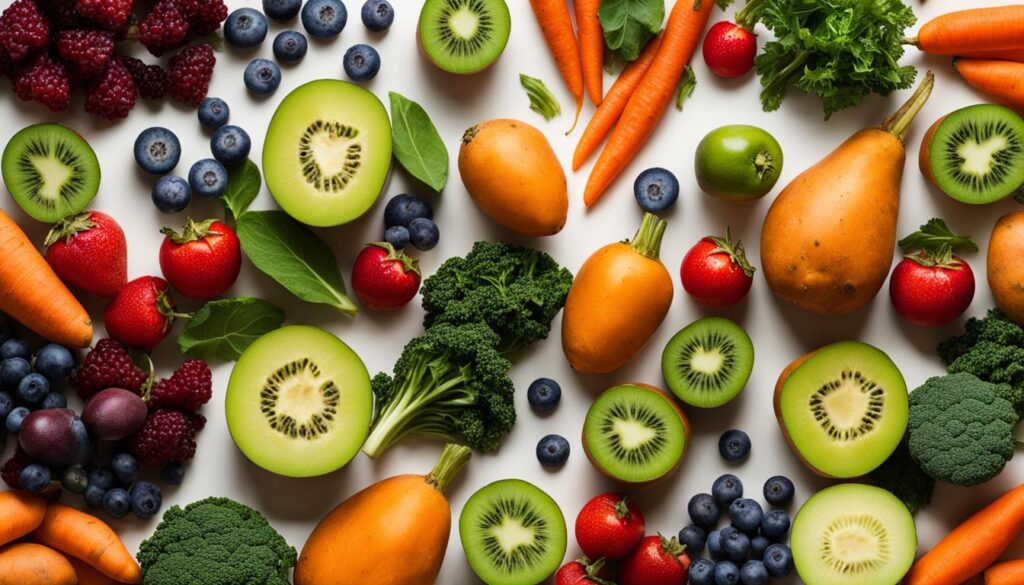
In addition to chia seeds, there are several other superfoods that can benefit a dog’s health. Incorporating these nutrient-rich foods into their diet can enhance their overall well-being and provide essential vitamins, minerals, antioxidants, and protein.
Vegetables
Vegetables such as sweet potato, kale, and carrots are excellent choices for dogs. They are packed with vitamins A, C, and K, as well as fiber and minerals like potassium and manganese. These vegetables provide numerous health benefits, including improved digestion, immune support, and eye health.
Fruits
Fruits are another great addition to a dog’s diet. Watermelon and berries, such as blueberries and strawberries, are rich in antioxidants, which help protect against cell damage and boost the immune system. Fruits also provide essential vitamins and fiber, promoting overall health and well-being.
Protein Foods
Protein is essential for muscle development, energy, and overall growth in dogs. Oily fish like salmon and sardines are excellent sources of omega-3 fatty acids, which support brain health and reduce inflammation. Eggs are also protein-packed and provide important nutrients like choline and vitamin D. Quinoa is a plant-based protein alternative that offers a complete amino acid profile and is easily digestible.
When incorporating these superfoods into a dog’s diet, it is crucial to ensure proper portion sizes and consult with a veterinarian. They will provide personalized guidance and recommendations based on your dog’s age, breed, size, and specific dietary needs.
| Superfood | Benefits |
|---|---|
| Sweet Potato | Rich in vitamins A, C, and K, fiber, and minerals. Supports digestion, immune function, and eye health. |
| Kale | Packed with vitamins A, C, and K, antioxidants, and fiber. Supports bone health, immune function, and digestion. |
| Carrots | High in beta-carotene, vitamins A and K, and fiber. Promotes eye health, healthy skin, and aids digestion. |
| Watermelon | Contains vitamins A, B6, and C, as well as antioxidants. Hydrates, supports immune function, and aids in healthy digestion. |
| Berries | Rich in antioxidants, vitamins, and fiber. Supports brain health, immune function, and cardiovascular health. |
| Oily Fish (Salmon, Sardines) | Excellent source of omega-3 fatty acids, protein, and minerals. Promotes brain health, reduces inflammation, and supports joint health. |
| Eggs | Provide high-quality protein, choline, and vitamin D. Supports muscle development, energy, and overall growth. |
| Quinoa | A plant-based protein source with all essential amino acids. Provides energy, aids digestion, and supports overall health. |
The Growing Popularity of Chia Seeds in the Market
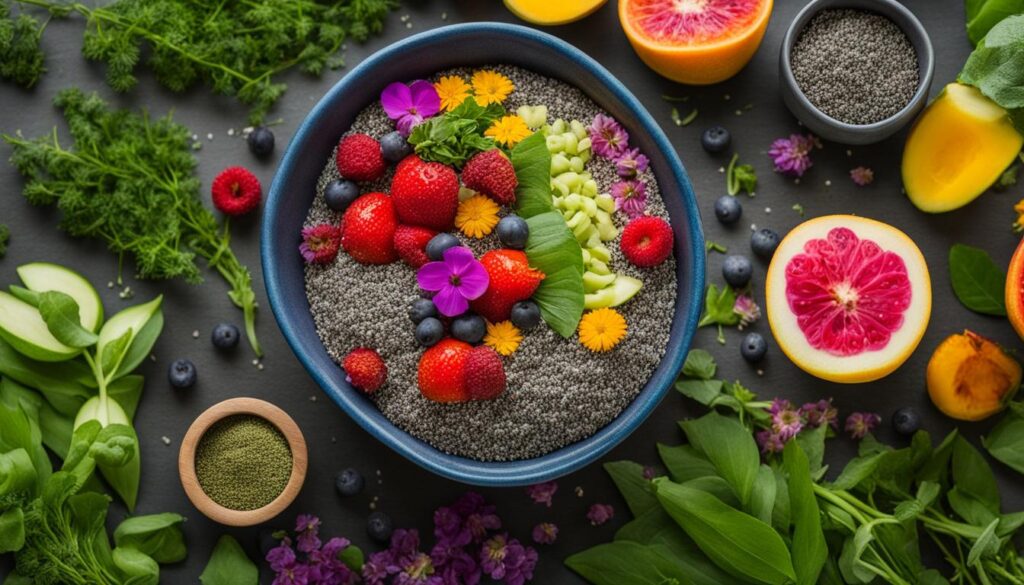
Chia seeds have emerged as a popular choice among health-conscious consumers, fueled by the growing interest in plant-based foods and their associated health benefits. With their rich nutritional profile and versatility, chia seeds have found their way into various packaged foods and beverages, catering to the demands of a diverse consumer base.
The global chia seed market is projected to reach a market value of $4.7 billion by 2025, reflecting the increasing consumer awareness of the health advantages offered by these tiny powerhouses. The high omega-3 fatty acid content of chia seeds has garnered significant attention, as these essential fatty acids are known to support heart health, reduce inflammation, and improve cognitive function.
Chia seeds have become a go-to ingredient in a wide range of packaged foods and beverages, adding a nutritious boost to products that align with the growing demand for plant-based options. They can be found in breakfast cereals, energy bars, gluten-free snacks, bread, pasta, pudding mixes, dressings, and ready-to-drink beverages. Chia seeds lend a delightful texture and nutritional oomph to these products, appealing to health-conscious consumers seeking convenient and nutritious options.
Moreover, the versatility of chia seeds extends beyond packaged goods to the foodservice industry. They are widely used in foodservice applications, such as smoothies, grain bowls, and oatmeal, providing an easy and delicious way to enhance the nutritional content of various dishes. The inclusion of chia seeds in these culinary creations adds a pleasant crunch, boosts fiber content, and increases the overall nutritional value of the meal.
The rising popularity of chia seeds in the market is a testament to the growing consumer interest in incorporating nutrient-dense, plant-based foods into their diets. With their impressive nutrient profile, versatility, and numerous health benefits, chia seeds have secured a prominent place in the ever-expanding market of health-conscious and environmentally conscious consumers.
Chia Seed Safety and Quality Control
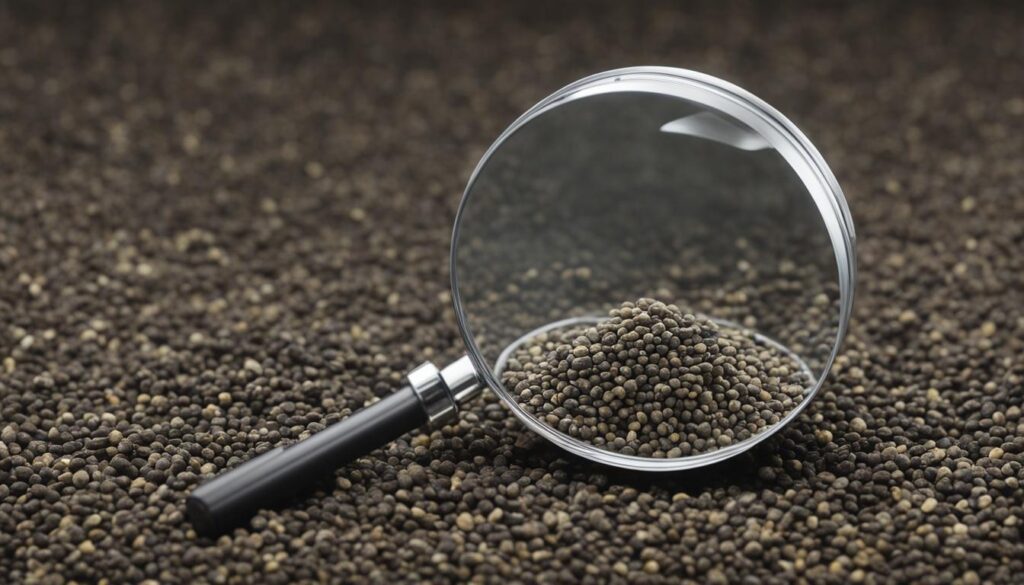
When it comes to using chia seeds in food products, safety is of utmost importance. Suppliers of chia seeds must prioritize proper processing methods to ensure the elimination of any pathogens while maintaining the nutritional integrity of the seeds. Steam treatment is a commonly employed technique that effectively eliminates harmful microorganisms without compromising the quality of the chia seeds.
Allergen control is another crucial aspect to consider during chia seed processing. Implementing rigorous procedures to prevent cross-contact with allergens is essential to ensure the safety of consumers, particularly those with sensitivities or allergies. By adhering to strict allergen control measures, chia seed suppliers can confidently provide allergen-free products to meet the diverse needs of the market.
Working with a Reputable Supplier
Collaborating with a reputable chia seed supplier is integral to achieving optimal safety and quality control. A reliable supplier will prioritize the implementation of rigorous safety protocols and adhere to industry standards. They will have well-established processes in place to ensure that the chia seeds they provide are free from contaminants and adhere to strict quality control measures.
By partnering with a reputable supplier, food manufacturers can confidently incorporate chia seeds into their products, knowing that they are sourced from a trusted and reliable source. This enables them to meet consumer demand for healthful and nutritious food options without compromising on safety or quality.
| Safety Considerations | Processing Methods | Allergen Control Procedures |
|---|---|---|
| Ensure chia seeds are safe for consumption | Employ steam treatment to eliminate pathogens | Follow strict procedures to prevent cross-contact with allergens |
| Collaborate with a reputable supplier | Ensure chia seeds are processed with high safety standards | Provide allergen-free chia seed products |
| Confidently incorporate chia seeds into food products | Maintain nutritional quality of the seeds | Ensure safety for consumers with allergies |
Wrapping Up
In conclusion, incorporating chia seeds into a dog’s diet can have numerous benefits for their overall health and well-being. Chia seeds are packed with essential nutrients such as omega-3 fatty acids, fiber, protein, antioxidants, and vitamins, which can support immune system function, improve skin and coat health, promote joint mobility, and regulate blood sugar levels. However, it is important to introduce chia seeds gradually and monitor for any adverse reactions. Consulting with a veterinarian before making any dietary changes for your dog is always a wise decision.
In addition to chia seeds, there are various other superfoods that can enhance a dog’s nutrition. Including vegetables like sweet potatoes, kale, and carrots, fruits such as watermelon and berries, and protein-rich foods like oily fish, eggs, and quinoa can provide a wide range of benefits. These superfoods can be incorporated into a dog’s diet to further enhance their overall nutritional intake.
The increasing popularity of chia seeds in the market reflects the growing demand for plant-based foods. Chia seeds can be found in a variety of packaged foods and beverages, including breakfast cereals, snacks, bread, pasta, pudding mixes, dressings, and ready-to-drink beverages. They are also commonly used in foodservice applications such as smoothies, grain bowls, and oatmeal. However, it is important to ensure the safety and quality of chia seeds in food products through proper processing and allergen control measures.
By following these guidelines and considering the specific needs of your dog, you can safely incorporate chia seeds into their diet, promoting a healthier and happier life for your four-legged friend.
FAQ
Are chia seeds beneficial for dogs?
Yes, chia seeds are considered a superfood for dogs due to their numerous health benefits.
What nutrients do chia seeds contain?
Chia seeds are packed with omega-3 fatty acids, fiber, protein, antioxidants, iron, magnesium, calcium, and B vitamins.
How can I incorporate chia seeds into my dog’s diet?
You can sprinkle a small amount of chia seeds on top of your dog’s meals.
How do chia seeds benefit a dog’s skin and coat?
Chia seeds promote a healthy coat and skin, reduce inflammation, and support brain health.
Can chia seeds improve a dog’s digestion?
Yes, the fiber content in chia seeds promotes regular bowel movements and can help dogs with digestive issues.
Are chia seeds safe for dogs?
Chia seeds are generally safe for dogs, but it is important to introduce them gradually and consult with a veterinarian.
What other superfoods can benefit a dog’s health?
Vegetables, fruits, oily fish, eggs, and quinoa are some other superfoods that can enhance a dog’s nutrition.
How popular are chia seeds in the market?
Chia seeds have gained significant popularity and are used in a variety of packaged foods and beverages.
How can chia seed safety be ensured in food products?
Chia seed suppliers should employ proper processing methods and follow allergen control procedures to ensure safety.


